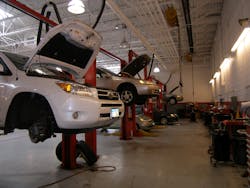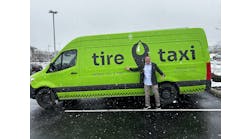The repair wasn’t done right.” Ever hear this from a customer? About 75% of the time, this statement results in the dreaded service “comeback.” That leaves 25% of your customer base that doesn’t even give you a chance to even make things right.
This is an expensive problem. Out of control, it could quickly lead to the collapse of your dealership, especially if you factor in online reputation, plus the fact that an estimated 20% of dissatisfied customers cite poor treatment from employees as a reason to never return to an auto service outlet. And I assume those two factors are related to each other. But why?
Most technicians are pretty good at what they do. Yet when we see a comeback, we often assume that a technician has made a mistake. And sometimes he did. I’ve seen my share of bent backing plates or a mistake in the reassembly of parts. But these things aren’t common.
When looking at comebacks, you have to trace the problem all the way to the root cause. And in my opinion, the root cause is most commonly — but not exclusively — rushing through what we call “the interview.”The interview is the early-on discovery segment of the sales process. It’s when a good advisor slows down the rush to get to the “sell part” of the process and takes enough time to understand everything he or she can possibly know about the customer’s problem.
Take a common customer complaint, like squealing brakes. When did the squealing noise start? When is it heard? Only in the morning? When the car is in reverse gear? All the time?
I’m not a fan of rapid-fire, close-ended questions. But a summarizing inquiry, such as, “Tell me about the conditions when the noise occurs,” with some follow-ups, will often suffice.
Asking the right questions will give you a better understanding of what your store is dealing with and could help craft a real solution for the customer.
I know that the main objection to asking multiple questions early in the process is lack of time. Maybe there’s a long line of customers? Maybe the phone is constantly ringing? None of those things are good enough reason to short-change the person standing right in front of you.
This person has already made the commitment of bringing his or her vehicle to you. He or she has made a mental decision to spend at least a pre-specified amount of money with you to solve the vehicle’s problem. To rush through this crucial step is wrong on every level.
If you spend just a few minutes asking some probing questions of the customer about their needs, you will have proven that you listened, which is step one of earning trust. If you commit to listening, then the customer will commit to hearing what you have to say when you present your findings.
The technician also needs as much information as possible to correctly do his or her job.
Never in my life have I heard a tech complain that too much information was collected on an inspection or diagnostic. Never.
Many times, comebacks are also the product of a push for results at the end of the day. Some techs, under intense pressure, make the gut call to take a shortcut so that they will meet the demands of the environment, the due time on the ticket, or the next car to be serviced.
They are not bad techs. They are just coping with the demands imposed upon them.
Most techs come to work to do a good job. Sometimes they get in over their heads, time-wise or skill- wise. And without all the information they need, techs can spend too much time trying to fill in the blanks.
Once you get behind in even a slightly busy store, this problem will snowball.
The solution? There are times in the selling process where we need to “pump the brakes” and slow down.
Make an effort this month to really listen to your customers. Pay attention to your store’s service advisors, too. Are they taking enough time to collect the necessary information?
If not, walk them through some scenarios and have them practice slowing down. I promise you: Your business will operate more efficiently if you properly “interview” your customers. You have to make time for it. ■


